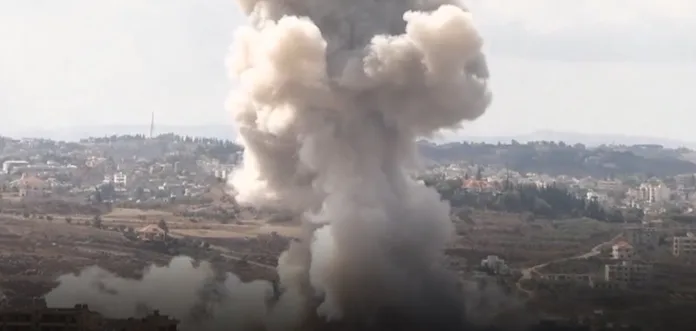A surge of Israeli airstrikes resulted in a tragic loss of life in Lebanon, prompting international calls for de-escalation.
On September 23, 2024, Israel executed a significant escalation of its military operations in Lebanon, marking the deadliest day since the 2006 war with Hezbollah. The intense barrage of airstrikes killed more than 500 people, including women and children, and injured over 1,800 others, according to Lebanese health authorities. The airstrikes unleashed terror and despair among residents as they rushed to evacuate their homes, seeking safety amid the chaos.
Israeli Prime Minister Benjamin Netanyahu asserted that Israel is shifting the “balance of power” in its northern region. The Israeli Defense Forces (IDF) claimed to have targeted approximately 1,600 Hezbollah assets across Lebanon, including military installations and weapon depots. The airstrikes focused primarily on southern and eastern Lebanon, particularly near the border with Syria, where Hezbollah maintains a significant presence.
The conflict escalated further when Hezbollah confirmed the death of one of its senior commanders, Ibrahim Qubaisi, who Israeli forces claimed to have killed in an airstrike in southern Beirut. This loss was a significant blow to Hezbollah, underscoring the intensity of Israel’s military campaign.
As the airstrikes unfolded, residents received urgent evacuation warnings through text messages and calls from unknown numbers. An Israeli radio station was reportedly hacked to broadcast evacuation notices, compelling residents to flee quickly from areas believed to be targets. Many reported hearing Israeli warplanes overhead from early morning, creating an atmosphere of panic as they sought refuge.
The strikes led to widespread disruption across Lebanon, with schools and universities shutting down and some flights to and from Beirut suspended. Several institutions opened their doors to shelter those seeking safety, highlighting the humanitarian crisis unfolding in the wake of these military actions.
The Israeli government responded by declaring a “special situation,” granting authorities the ability to impose restrictions on civilian life, including limitations on public gatherings. Despite the ongoing strikes, neither Israel nor Hezbollah officially labelled the escalation as a war, indicating a complicated and nuanced situation.
In retaliation, Hezbollah launched multiple rocket barrages into northern Israel, targeting military bases such as Ramat David and Meggido. The IDF reported intercepting most of the incoming projectiles, maintaining a defensive posture amid the increasing hostilities.
As the situation continues to develop, international observers express growing concern that these strikes could lead to a wider regional conflict, urging both sides to de-escalate tensions before the situation spirals further out of control.
Analysis:
Political: The recent airstrikes and the resulting casualties mark a critical juncture in Israeli-Lebanese relations. Netanyahu’s focus on shifting the power dynamic indicates a strategic military approach, potentially aimed at consolidating domestic support amid rising tensions. However, the intensification of strikes raises concerns about the stability of the region, prompting various governments to advocate for immediate diplomatic interventions. The situation could influence upcoming political discussions in both Israel and Lebanon, potentially affecting alliances and regional policies.
Social: The humanitarian crisis triggered by these airstrikes emphasizes the social ramifications of military conflict. With over 500 casualties, the impact extends beyond immediate losses to encompass widespread trauma among survivors and families. Many civilians, particularly women and children, find themselves vulnerable, facing displacement and loss of loved ones. The societal fabric of Lebanon, already strained by economic hardships, now grapples with the aftermath of violence, which may lead to increased social unrest or demands for governmental accountability in responding to the crisis.
Racial: The ongoing conflict underscores ethnic tensions in the region, particularly the historical animosities between Israeli and Lebanese populations. The portrayal of the conflict in media and public discourse often frames it through a racial lens, which can exacerbate divisions. The casualties reported, including many civilians, highlight the indiscriminate nature of modern warfare, prompting discussions about the need for humanitarian considerations in military operations and the protection of civilian lives, regardless of nationality or ethnicity.
Gender: The consequences of military conflict disproportionately affect women and children, who often bear the brunt of violence and displacement. In this latest escalation, reports of casualties among women and children emphasize the need for a gender-sensitive approach to humanitarian responses. As communities face destruction, women often take on greater responsibilities for their families’ safety and well-being, potentially challenging traditional gender roles. Addressing the unique challenges faced by women in conflict zones must become a priority in both humanitarian aid and policy discussions.
Economic: The economic implications of these airstrikes extend across the region, as ongoing violence disrupts trade, travel, and local economies. Lebanon, already grappling with severe economic instability, faces further setbacks as infrastructure and public services suffer damage. The international community must recognize the economic dimensions of this conflict, as they significantly impact the prospects for recovery and stability in Lebanon. A prolonged conflict could hinder foreign investments and aid efforts, exacerbating the humanitarian crisis and deepening economic despair.
